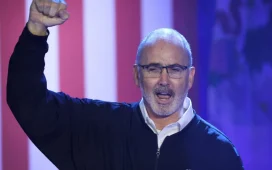“I think this is a colossal failure in asset-liability risk management,” Mark T. Williams, a former bank examiner for the Federal Reserve, tells me.
Williams is referring to actions that led to Silicon Valley Bank’s seizure by federal regulators on Friday following a bank run. It’s being deemed the largest institutional failure since the 2008 financial crisis. SVB is a major lender for the tech and venture capital sectors. But the bank didn’t have a chief risk officer for about eight months, Fortune reported.
SVB’s parent company, SVB Financial Group, disclosed on March 8 its big bet—it sold $21 billion of bonds, resulting in an after-tax loss of $1.8 billion for the quarter, Fortune reported. Many of those bonds were yielding an average 1.79%, far below the current 10-year Treasury yield of around 3.9%. SVB also disclosed it was conducting a stock sale worth $2.25 billion in an attempt to shore up its finances. But as my colleagues Anne Sraders, Jessica Matthews, and Kylie Robison write, this news caused panic among investors. On Thursday, investors and depositors tried to pull $42 billion from SVB.
The actions of the CEO and CFO
“Customers losing trust was obviously a big trigger in SVB’s collapse,” says Thomas Smale, CEO of FE International, a mid-market tech-focused M&A company. Concerned clients were already calling rival banks looking to move large balances in excess of FDIC insurance caps, Smale says. In addition, there were some venture-capital investors who advised startups to pull their money out of the bank to avoid losses should the bank fail, he says.
And the actions of SVB Financial Group CEO Greg Becker added fuel to the fire. “He sold significant personal stock holdings in the last week ($3.6M on Feb. 27),” Smale says. “So, I do not think this is good optics for investors and likely has not helped the speed at which the situation has publicly escalated. Actions often speak louder than words in these situations.”
Meanwhile, also prior to the bank’s collapse, on March 1, SVB Financial Group CFO Dan Beck reported the sale of 2,000 shares of SVIB at an average of $287.59, totaling over $575,000. Beck joined the bank in June 2017 with a starting annual base salary of $525,000. He is responsible for all finance, treasury, and accounting functions and also serves on SVB’s executive committee. Before SVB, Beck was CFO and treasurer at Bancwest Corp. He also held financial positions at Wells Fargo and Freddie Mac.
“To prevent a crisis of confidence, SVB’s CEO and CFO should have relied more on an old-fashioned banking approach of diversification of its lending and deposit customers,” says Williams, a master lecturer in the finance department at Boston University’s Questrom School of Business. “Venture capital is a highly risky business. So not only did the bank expose its asset side of the balance sheet but also its liability side.”
“The CFO and, I would argue, the board failed to adequately protect shareholder value,” Williams says. “The board-appointed risk management committee, which works closely with the CFO, should have done adequate scenario analysis to examine the deposit withdrawal risk. That, in fact, was the bank’s downfall.”
Going forward
The U.S. Treasury, the Federal Reserve, and the FDIC, issued a joint statement on Sunday that SVB depositors will be able to access their money, and no losses associated with the resolution of SVB will be borne by the taxpayer. A top priority of the Treasury and the FDIC is to find a buyer for the bank. HSBC announced today a deal to buy the U.K. subsidiary of SVB.
In the U.S., SVB banked nearly half of 2022 venture-backed tech and life science companies. And in 2022, 44% of U.S.-venture-backed technology and health care IPOs, according to the company. “Unlike typical retail bank customers, 95% of SVB’s depositors were not FDIC-insured,” Williams says.
Will SVB’s downfall impact public companies? “In the near-term, there is minimal exposure from a public company perspective around this SVB implosion, and outside of Roku and a handful of others in the tech world with money at the bank, we see negligible impact on the cash balances of public tech players,” Wedbush analysts wrote in a note on Sunday. “However, while we have heard from public CFOs since Friday night across the board which should calm down initial tech investor fears, the bigger and more troubling story is how this will change the start-up and VC community going forward.”
You can read Fortune’s continual coverage of the fall of SVB here.
Sheryl Estrada
sheryl.estrada@fortune.com
Big deal
Prophix, a global finance performance platform for mid-market businesses, released its 2023 Finance Leaders Survey. The top five external pressures finance leaders are facing include inflation, rising energy prices, fears of recession, talent issues, and rising interest rates. When asked about the main focus of their teams this year, 43% of finance leaders said finding innovative ways to drive current processes. Meanwhile, 31% said elevating the finance department to become a strategic contributor to the business. And 25% said preparing the organization for challenging times ahead. The findings are based on a global survey of more than 700 global senior-level finance professionals across industries, including business/professional services, education, health care/senior living, construction, manufacturing, and real estate.
Going deeper
In a Wharton business journal tool for leaders,”Choosing a New Board Leader: Eight Questions,” Wharton’s Mike Useem and his coauthors suggest the questions that can help guide your search for a new board leader. “Our experience (the four of us have interacted with well over a fifth of the governing boards of the Fortune 1000) indicates that many boards may not have enough clarity on their roles and responsibilities,” the authors write.
Leaderboard
Matt Osberg, CFO at Helen of Troy Limited (Nasdaq: HELE), a global consumer products company, announced his resignation, effective April 27. Osberg was named EVP and CFO at Apogee Enterprises, Inc. (Nasdaq: APOG), effective April 28. Brian Grass, retired Helen of Troy CFO, is expected to join the company as SVP, assistant CFO on March 21, and will become interim CFO beginning April 28. Helen of Troy will begin an immediate national search for a new CFO.
Carlos Smith was named CFO at Paragon Space Development Corporation. Smith has over 30 years of financial leadership experience. Before joining Paragon, Smith’s career includes serving as CFO at IAI North America (Stark) Aerospace Division, SVP and CFO at Leonardo DRS Airborne & Intelligence Systems, and most recently as CFO of Dawson Operating Companies. Smith also spent over a decade with L-3 Technologies Vertex. Smith also served in the U.S. Army Reserve as an internal auditor.
Overheard
“The Fed should immediately buy all the securities/debt the bank owns at near par, which should be enough to cover most deposits. Any losses paid for in equity and new debt from the new bank or whoever buys it. The Fed knew this was a risk. They should own it.”
—Mark Cuban, tech billionaire and owner of the NBA’s Dallas Mavericks, tweeted on March 10 that he wants the Federal Reserve to buy Silicon Valley Bank’s debt.





